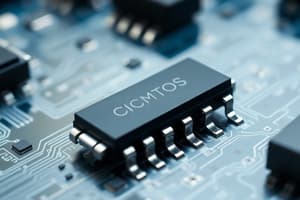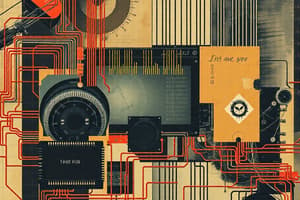Podcast
Questions and Answers
Who pioneered the concept of digital logic?
Who pioneered the concept of digital logic?
- Alan Turing
- George Boole (correct)
- Gottfried Wilhelm Leibniz
- Charles Sanders Pierce
Which branch of electronics focuses on continuous signals?
Which branch of electronics focuses on continuous signals?
- Microelectronics
- Digital electronics
- Quantum electronics
- Analog electronics (correct)
Which mathematician developed the binary number system in 1705?
Which mathematician developed the binary number system in 1705?
- Alan Turing
- George Boole
- Gottfried Wilhelm Leibniz (correct)
- Charles Sanders Pierce
What are the key components in digital electronics that process binary data?
What are the key components in digital electronics that process binary data?
Who suggested the idea of performing logical operations through electrical switching circuits?
Who suggested the idea of performing logical operations through electrical switching circuits?
What was the key development that enabled power electronics and paved the way for microprocessors and microcontrollers?
What was the key development that enabled power electronics and paved the way for microprocessors and microcontrollers?
Which technology became increasingly important with the rise of telecommunications, audio and video technologies, and image processing?
Which technology became increasingly important with the rise of telecommunications, audio and video technologies, and image processing?
Which of the following techniques emerged in the late 20th and early 21st centuries, enabling highly customized electronic devices and systems?
Which of the following techniques emerged in the late 20th and early 21st centuries, enabling highly customized electronic devices and systems?
Which characteristic of digital electronics is highlighted as contributing to its importance across various industries?
Which characteristic of digital electronics is highlighted as contributing to its importance across various industries?
According to the passage, in which of the following industries does digital electronics play a vital role?
According to the passage, in which of the following industries does digital electronics play a vital role?
Flashcards are hidden until you start studying
Study Notes
Understanding Digital Electronics: From Fundamentals to Advanced Techniques
Digital electronics is a vital branch of electronics that deals with digital signals and the creation of devices employing those signals. Unlike analog electronics, which focus on continuous signals, digital electronics utilizes discrete binary signals. This makes it an integral part of various technological advancements and everyday devices. Here, we explore the basic concepts and advanced techniques in digital electronics.
Fundamentals of Digital Electronics
Digital electronics can be traced back to the development of the binary number system by Gottfried Wilhelm Leibniz in 1705. The concept of digital logic was pioneered by George Boole in the mid-19th century, who found a way to combine arithmetic and logic principles. However, it wasn't until the early 20th century that Charles Sanders Pierce suggested the idea of performing logical operations through electrical switching circuits.
At the core of digital electronics are digital circuits, typically composed of complex arrays of logic gates, often housed within integrated circuits. Although digital electronics focuses on binary signals, it still involves significant analog design aspects.
Key Components and Logic Operations
Key components in digital electronics include logic gates, flip-flops, registers, counters, multiplexers, and various other digital systems that process binary data. Boolean Algebra, named after George Boole, plays a crucial role in digital electronics, providing a mathematical framework to handle logical statements.
Advanced Techniques and Modern Developments
As technology advanced, digital electronics evolved alongside it. The transistor revolution in the mid-20th century made power electronics possible, leading to microprocessors and microcontrollers systems essential for computer and embedded system design. Digital signal processing became significant with the rise of telecommunications, audio and video technologies, and image processing.
In the late 20th and early 21st centuries, new techniques like Field Programmable Gate Array (FPGA) and Application Specific Integrated Circuit (ASIC) designs emerged, allowing for highly customized electronic devices and systems. These advancements enabled high performance and energy efficiency, shaping our world today.
Digital electronics continues to play a vital role in various industries, including computer architecture, communications, automotive engineering, healthcare, and more. Its importance lies in its precision, reliability, and ability to adapt to technological advancements.
Studying That Suits You
Use AI to generate personalized quizzes and flashcards to suit your learning preferences.




